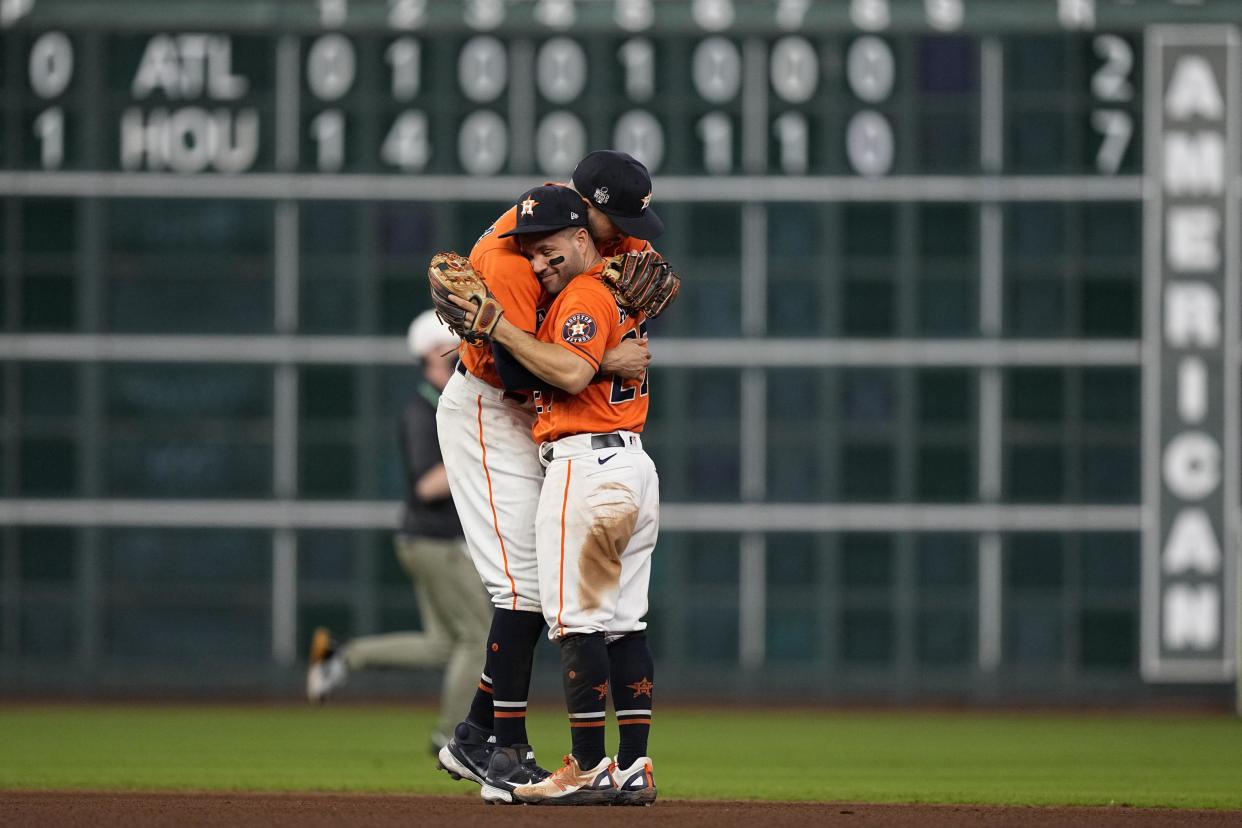Astros' Old School Game 2 Win Reveals Their Blueprint to Winning World Series

Dusty Baker didn't like the narrative after the Houston Astros' Game 1 loss of the World Series to the Atlanta Braves.
"Some people in this room thought the series was over after one game," the Houston Astros manager said after Game 2 on Wednesday night at Minute Maid Park. "But it's a seven-game series."
Baker guided the Astros to a 7-2 win to even up the series, effectively changing the narrative.
That's the nature of a seven-game series. The scripts flip and stories are written and rewritten several times over.
The story of Game 2 was as old school as Baker himself: The Astros got five solid innings out of right-hander Jose Urquidy, while the offense took advantage of defensive miscues from the Braves to get an early lead and kept it. The bullpen, which has allowed only a single run in 11 innings of work in the World Series, locked down the game.
This is a loaded lineup from 1-to-7 and even the No. 8-9 hitters, reserve outfielder Jose Siri and catcher Martin Maldonado, proved that good things can happen when they're putting the ball in play.
The game was tied 1-1 in the bottom of the second when Siri's legs helped propel the Astros to plating four in the inning to amass a lead that was too big for the Braves to touch.

Yuli Gurriel beat the shift with one out. Siri beat the tag on an infield single to score Kyle Tucker and give Houston a 2-1 lead. Maldonado then singled to left to score Gurriel. The rally could have ended there had left fielder Eddie Rosario made a routine defensive play, but instead he threw the ball to third base with no one covering the bag and Siri came sprinting home to score as well.
Twenty-four hours prior, Rosario had been the hero of the night when he went 2-for-5 with a double and a run scored in the Braves' Game 1 win. Rosario has been one of the postseason's biggest stars, breaking out in a huge way after coming over in a trade at the July 30 deadline from Cleveland for Pablo Sandoval and cash—mere pennies.
Rosario was the trade that made Braves general manager Alex Anthopoulos look smart. He was the NLCS MVP and had hit safely in each postseason game played until Wednesday night when he went 0-for-4.
But the loss can't be pinned on Rosario. It's too soon to suggest he's cooling off or coming back to earth. Max Fried, the Atlanta ace, gave up key hits on soft contact in that fateful second inning. With Charlie Morton out for the series with a fractured fibula, the Braves were looking for a big outing from Fried—who was so crucial to the team's success earlier in the playoffs—and he did give the team five full innings, but that second inning proved the difference.
"It's baseball," Fried said after the game. "Sometimes the ball gets hit and goes right to a guy. Sometimes it doesn't. Sometimes it finds a hole."

This was an anti-Astros rally. The heavy hitters haven't been doing much as of late, and that big hit never came. This was role players advancing runners and making things happen on the basepaths, but it was still effective.
Not every World Series hero has to hit a home run. Sometimes it's just an infield single that gets the job done.
"It happened fast," Baker said. "It's like a feeding frenzy that everyone wants to get in on, and I was just hoping we could score some more because you knew they were going to threaten before too long."
Per ESPN's Sarah Langs, the Astros have scored 46 runs this postseason with two outs, which is tied with the 2004 Boston Red Sox and Cleveland in 1997 for the second-most in a single postseason. Last year's Los Angeles Dodgers are the only other team to score more with two away (59).
Is that stat indicative of another Astros World Series? Maybe, but probably not. Sure, Houston is in good company, and it means its hitters have good approaches with two outs. But the postseason is too unpredictable to be forecasting a winner based on a stat like that.
This statistic, from Anthony Masterson, a researcher for the MLB on FOX crew, shows just how unpredictable this entire postseason has been: Only nine total saves have been recorded this postseason, which is three fewer than any year since playoffs expanded in 1995.
The 4.15 average margin of victory per game is the third-highest since 1969, meaning teams aren't scraping out victories, they're beating up on their opponents—especially the Astros, who have scored five or more runs in 10 games this month.
"You never really feel comfortable during these playoffs and during the World Series," Baker said. "You're always wanting more."
The Astros always seem to have more. They have had more offense, more pitching and more of a stifling defense than the other teams they've played so far.
In this particular game, they took the less is more approach with that second inning, and it was still effective.
The narratives may change again with the series moving to Atlanta, but if the Astros can stick to this story, they may be able to hold off the Braves for their second World Series in five years.


